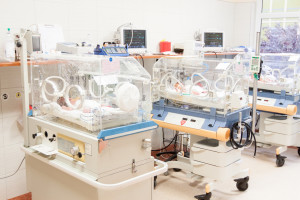Revolution in pharmacies. Changes will affect millions of Poles

- - After a dozen or so years, there is a need to modify access to medicines from drug programs. The recently published draft amendment to the Reimbursement Act assumes the introduction of the so-called fourth category of medicine availability for this purpose - reminds M.Pharm. Karolina Wotlińska-Pełka, president of the Częstochowa District Pharmaceutical Chamber Council
- The patient, opting for a new form of continuing treatment, would still be under the care of a specialist, but the drug could be administered in a specialist outpatient clinic in accordance with the required procedures.
- It is also possible for the patient to receive the therapy from a public pharmacy.
- - Patients who have prescriptions for medicines from drug programs can count on pharmaceutical advice - adds the head of the Częstochowa ORA
Drug programs began operating in Poland with the introduction of the Reimbursement Act in 2012, replacing therapeutic health programs. When reforming the area of reimbursement policy, it was recognized that drug programs would allow for faster and more effective introduction of new therapies. Today, drug programs are over one hundred and thirty different treatment options with modern drugs. In 2024, over 250 thousand patients used them - quotes in a column for Rynek Zdrowia Karolina Wotlińska-Pełka, M.Pharm., president of the Częstochowa District Pharmaceutical Chamber, chairwoman of the NRA Subcommittee for Prevention and Education.
After a dozen or so years, however, the need to modify access to medicines from drug programs has emerged. The recently published draft amendment to the Act on the Reimbursement of Medicines, Foodstuffs for Special Nutritional Uses and Medical Devices assumes the introduction of the so-called fourth category of drug availability for this purpose.
Drug programs are commonly associated with futuristic technologies requiring hospitalization of the patient. The truth is, however, that divided into therapeutic areas, programs can also be provided on a one-day or outpatient basis.
The rapid development of technology has resulted in many previously expensive drugs having their generic versions, and their prices have dropped significantly. Drugs used in drug programs are not only intravenous drugs administered in multi-hour infusions and requiring premedication, but often tablet, subcutaneous or intramuscular preparations.
Hence the idea to increase the availability of such drugs and to offer stable patients the opportunity to continue treatment outside their current centers and enable them to obtain the necessary drugs more quickly, e.g. at a nearby pharmacy.
Care of a specialist, administration of medication in an outpatient clinicThe “Flexcare” report, initiated by the “Farmacja Polska” Chamber of Commerce, indicated that the description of nineteen drug programs provides for the possibility of continuing therapy at the patient’s home.
The report description can be read in Rynek Zdrowia: A medicine from the medicine program to be collected at a local pharmacy. The pharmacist would be rewarded
This applies to drugs used in haemophilia and asthma, as well as various forms of administration: oral, subcutaneous, pens or pumps for intravenous administration. However, this solution is not common or financially promoted, which forces patients to travel often several hundred kilometers to centers conducting drug programs.
Access to drug programs can be difficult. We know that the system is struggling with insufficient specialist resources. A patient who decides on a new form of continuing treatment would still be under the care of a specialist and could benefit from consultations in the form of teleconsultations. The preparation could be administered in a specialist outpatient clinic, while maintaining the required procedures. At the same time, redefining the programs would reduce the burden on the system and increase the number of centers that provide highly specialized drug services.
Of the more than 130 drug programs operating at the end of 2024, the Flexcare report indicates that in 68 programs all drugs could be qualified for the new reimbursement category, and in another 27, some of them. There is therefore no justification for a patient or someone close to them to make a visit only to receive a drug to continue chronic therapy.
From expert discussions, we know that the areas mentioned for inclusion in the new availability category are drugs from the treatment program for psoriasis, arthritis (rheumatoid, psoriatic, but also AS), multiple sclerosis, ulcerative colitis and lipid disorders.
Medicines should be closer to the patientThe qualification of drugs for the new reimbursement category would be carried out by consultants and experts in a given field. Observing the discussion that has been going on in this area for several years, it is clear that specialists agree on the justification for the planned change. We only know the project, there are no details yet, but we know that the fourth category will not apply to oncological drugs. It is also to be reserved for oral forms, administered subcutaneously or intramuscularly.
More on the Ministry of Health's proposal for 4 categories of availability here: They will be available for collection at the pharmacy. A revolution for doctors and patients
We must remember that many of the drugs used in the programs are drugs with a known safety profile, which have been functioning in the system for a long time. Some were available under pharmacy reimbursement before the introduction of drug programs. I myself remember prescriptions for doxorubicin, which caused a problem. Patients did not always remember that it was an antibiotic that had to be purchased within seven days of the prescription being issued. Therefore, not all drugs functioning in drug programs are unfamiliar to pharmacists.
On the other hand, a large group of prescription drugs is similar in cost to the prices of generic drugs from drug programs. We are constantly dispensing insulin, new hormonal analogues, and some oncological drugs in pharmacies. The fourth reimbursement mode is to provide the patient with a supply for a one-month treatment. This will prevent wastage of drugs, and on the other hand it will not reduce the amount of the drug in the system and will not overburden the budget of pharmacies.
The role of pharmaceutical servicesPatients who fill prescriptions for drugs from drug programs can count on pharmacist advice that will explain how to take them and identify any side effects. Disturbing symptoms, such as the appearance of a vision problem, may indicate the need to consult a specialist.
Pharmacists are well-prepared to support proper pharmacotherapy, they detect problems that they help patients cope with. We know that some biological preparations can have an immunosuppressive effect. The pharmacist will therefore pay attention to frequent and atypical infections, if they occur in the patient. There may be many similar interventions, of course, they will depend on the nature of the drug, but also on the patient's condition.
What also needs to be mentioned is the educational role of pharmacists. Our professional tasks include health promotion and disease prevention. The criteria for including a patient in drug programs, but also for their continuation, often include the need to conduct regular preventive tests: mammography, colonoscopy and cytology.
The assessed element is oral health, regular dental check-ups, but also a hygienic lifestyle. Pharmacists can support in each of these aspects, and additionally help maintain the effects of the fight against tobacco dependence syndrome.
Pharmacists are ready to cooperate with specialists who refer patients from drug programs to pharmacies. Prescriptions for drugs from programs may contain notes on what we should pay attention to, what possible tests, such as blood pressure or cholesterol level, should be performed. These notes may also contain instructions on what feedback the doctor expects.
The preparation of a consulted list of medicines in the fourth reimbursement mode will allow for the development of a partnership role between doctors and pharmacists. This solution will be beneficial for everyone, first of all for patients, doctors, pharmacists, and ultimately for the system.
Copyrighted material - reprint rules are specified in the regulations .
rynekzdrowia










